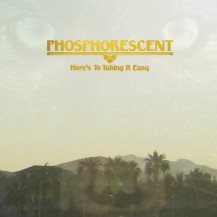Phosphorescent’s “Here’s to Taking it Easy”
“Many of the greats are mingled in the sounds heard here, but the beauty lies in that the songs seem to remain an offspring uniquely their own.” -Holly Etchison
Holly Etchison
8.8
out of 10
Phosphorescent
Here's to Taking it Easy
May 11, 2010
Dead Oceans
phos·pho·res·cence n.1. Persistent emission of light following exposure to and removal of incident radiation. 2. Emission of light without burning or by very slow burning without appreciable heat, as from the slow oxidation of phosphorous: “He saw the phosphorescence of the Gulf weed in the water” (Ernest Hemingway).
Matthew Houck of Phosphorescent had a major foot in the door with me when I heard his Willie Nelson tribute album, To Willie. Anyone who revives “The Last Thing I Needed (The First Thing This Morning),” and revives it so beautifully, is a friend of mine. We red-headed strangers tend to unite. It hearkens memories of being a child, hair still wet from the bath, dancing in my pajamas in the den on Saturday nights. My dad, a Texan transplanted in Georgia, would put “Stardust” on the record player and shuffle around the house in his cowboy hat. So I was almost sold before I heard any of the tracks on Phosphorescent’s latest release, “Here’s to Taking it Easy.” And when I did hear them, I felt that if I had been some sort of hybrid Grateful Dead fan, I could very easily slip into the Big Chillout aura these songs create. And even tho I hadn‘t been one, I was slip-sliding anyway. These are some dern good vibrations.
The opening track, “It’s Hard to Be Humble (When You’re From Alabama),” not only sums up what it is like to live in the southernmost states of the eastern U.S.–where all most everyone has to cling to is false pride, where it’s hard to make a statement like “Hear me Alabama I was never meant to carry no shame, ah but hear me Alabama, I can hear you when you’re calling my name.”–it also rip-roars its way down those southern streets. As a strange sense of attachment mingles with an overarching sense of not belonging, a jazzy trumpet beat is juxtaposed with a slide guitar. Utter pandemonium ensues near the end; Levon and the boys would be proud.
“Nothing Was Stolen (Love Me Foolishly)” has an almost anthemic vocal quality, reminiscent of, pardon the reference, Alabama’s “Song of the South” (you know, sweet potato pie and shut my mouth). A happy beat, more slide guitar, and ironic lyrics have you loving, foolishly or not. Girls and guys alike love a scoundrel, as long as he’s honest.
Apart from the things I touch
Nothing got broke all that much
And apart from the things I took
Nothing got stolen babe in love.
Pretty and vulnerably voiced, “We’ll Be Here Soon” is utterly satisfying as a ballad. The chorus is extremely singable and heart wrenching, a slow waltz in a moonlit barrio; a Spanish guitar serenades:
Dry your eyes in the setting sun
The pressure’s on and ain’t nothin’ fun
Babe you know it’s all been done
Tut you know it ain’t been done yet.
“The Mermaid Parade” lives up to its name. A narrative of busted up love, ”It Makes No Difference” meets “If You See Her Say Hello” and references mythical sea nymphs. A man finds himself where he’s not supposed to be, wandering on a beach watching the women in the “mermaid parade,” ruminating on a marriage whose demise was only a hair shorter than its length. The confusion, the sweet sadness, it is somehow a love song of loss, true to life in its desire to focus on something other than what is bringing pain, making it all the more painful in avoidance. It’s clever without trying, just real.
I could not decide if “Tell Me Baby (Have You Had Enough)” was transporting me to the opening bars of “What good am I?” or asking me “what’s a sweetheart like you doing in a dump like this?” Either way, I didn’t mind. A confessional, a plea, it is soft and kind, in a fatigued sort of way:
Tell me baby have I gone too far
I know I spend most of my life in these bars
Standing here with this old guitar
Tell me baby have I gone too far
The last sounds–short, seemingly disjointed guitar bits–are brilliant and seem to answer the question.
“Hej I’m Light,” all puns aside, truly shines. A spiritual chant, part Reggae, part groove, there is something to repeating a refrain for three or so minutes. “Hej, I’m Light” has you feeling the light by the end. It is a stand out track, unusual, but connected to the album as a whole. It prepares for the epic “Los Angeles” and there is no denying the sound of Cortez dancing across the water, back from his 1970s slumber, tiptoeing to a beautiful piano and heavy guitar. Are these echoes of Neil Young’s past? I don’t really care, I am glad to meet him again in this form, shining. A new twist on an old story, a new story with an old twist.
It seems, musically speaking, that Houck has been to the land of the legends and has returned driving down a back country road on a cool southern evening to share the instruction manual. Many of the greats are mingled in the sounds heard here, but the beauty lies in that the songs seem to remain an offspring uniquely their own.
Gram Parsons’ vision of a Cosmic American Music could yet be met in Phosphorescent, or at the least I feel Matthew Houck’s been handed a flashlight from heaven .
